- Home
- Gaston Leroux
Collected Works of Gaston Leroux Page 42
Collected Works of Gaston Leroux Read online
Page 42
Bernier walked in front of us, his head bent, looking like an accused man who is being led on his way to trial. And when we reached Rouletabille’s room, the young reporter bade Bernier sit down facing us. I lighted the lamp. Rouletabille sat silent for a moment, looking at Bernier, lighting his pipe the while, and evidently seeking to read in the face of the concierge all the honesty which he could find. Soon his knitted brows relaxed, his eye grew clearer and, after he had blown a few rings of smoke toward the ceiling, he said:
“Well, Bernier, how did they kill him?”
Bernier shook his shaggy head.
“I have sworn to say nothing and I will say nothing, monsieur. And, upon my word of honor, I know nothing.”
“All right,” went on Rouletabille, unconcernedly. “Tell me what you don’t know. For if you do not tell me what you don’t know, Bernier, I will be responsible for nothing, no matter what happens.”
“And for what could you be responsible in any case, monsieur?”
“For one thing, I won’t answer for your safety, Bernier.”
“For my safety? I have done nothing.”
“For the safety of all of us, then — for our lives, then!” replied Rouletabille, arising from his chair and pacing restlessly across the room, in order, doubtless, to give himself an opportunity to perform some necessary mental algebraic operation. Then he paused and went on, “Where was he? In the Square Tower?”
Bernier did not speak but he nodded assent.
“Where? In Old Bob’s bedroom?”
“No,” Bernier shook his head.
“Hidden in your rooms?”
Bernier shook his head vehemently.
“Well, where was he then? He could certainly not have been in the apartments of M. and Mme. Darzac!”
Bernier bowed his head.
“Miserable hound!” cried Rouletabille and he leaped at Bernier’s throat. I rushed to the rescue of the concierge and snatched him from the young man’s clutches. As soon as he could breathe, the old servant looked up, piteously.
“Why did you try to strangle me, M. Rouletabille?” he asked.
“How dare you ask, Bernier? How dare you? And you acknowledge that he was in the apartment of M. and Mme. Darzac! Who, then, gained him entrance to that apartment? No one but yourself. You, the only person who had the key when the Darzacs were not there!”
Bernier arose to his feet. He was as pale as a ghost, but his look and attitude were full of dignity.
“M. Rouletabille, do you accuse me of being an accomplice of Larsan?”
“I forbid you to pronounce that name!” shouted the reporter. “You know very well that Larsan is dead — and has been dead for months!”
“For months!” echoed Bernier, ironically. “Yes, that is true — I was wrong to forget it. When one devotes oneself to his masters and permits himself to be beaten and abused for them, it is necessary to ignore everything, no matter what they may do to you. I beg your pardon, sir.”
“Listen to me, Bernier. I know that you are a brave man and I respect you. It is not your good faith that I am questioning, but I am censuring your negligence.”
“My negligence!” Bernier, as pale as his face had been, flushed crimson. “My negligence! I have not budged from my lodge — not even from the corridor. I have always worn the key in my breast pocket and I swear to you that no one entered that room — no one at all — after you were there at five o’clock, except M. and Mme. Darzac, themselves. I do not count, of course, the few moments that you and M. Sainclair were there at about six o’clock.”
“What!” exclaimed Rouletabille. “Do you want me to believe that this individual — you have forgotten his name, I think, Bernier — let us call him ‘the Man’ — that the man was killed in M. Darzac’s rooms if he was not there?”
“I do not. And, furthermore, I can swear to you that he was there.”
“Yes, but how could he have been? That is what I ask you, Bernier. And you are the only one who can answer because you alone had the key in the absence of M. and Mme. Darzac. And M. Darzac never took the key with him when he left the room and no one could have gotten into the room to hide while he was there.”
“That is the mystery, monsieur. That is what puzzles M. Darzac more than all the rest. But I have only been able to answer him as I have answered you. There is the mystery.”
“When you left the room with M. Darzac, M. Sainclair and myself at about a quarter after six, did you lock the door immediately?”
“Yes, monsieur.”
“When did you open it after that?”
“Not at all.”
“And where were you in the meantime?”
“In front of the door of my lodge, watching the door of the apartment. My wife and I took our dinner in that same spot at about half after six, on a little table in the corridor, because, on account of the door of the tower being open, it was quite light and was pleasanter. After dinner, I sat in the doorway of the lodge, smoking a cigarette and chatting with my wife. We were so seated that, even if we had wished to do so, we would not have been able to withdraw our eyes from M. Darzac’s rooms. It is a mystery! — a mystery more extraordinary than the mystery of the Yellow Room. For, in the former case, we did not know of what had passed before. But now, monsieur, one knows all that happened beforehand since you yourself visited the apartment at 5 o’clock and saw that no person was there: one knows all that passed during the interim, for either I had the key in my pocket, or M. Darzac was in his room and must have seen the man who opened his door and entered the room for the purpose of assassinating him. And while I was sitting in the corridor before the door, I must have seen the man pass! And we know what took place after. After, there was the death of the man and that proved that the man was there. Ah, it is a mystery!”
“And from five o’clock until the moment of the tragedy, you declare that you never quitted the corridor?”
“I swear it.”
“You are absolutely certain?” persisted Rouletabille.
“Ah, pardon, monsieur — there was one moment — the moment that you called me.”
“That is good, Bernier. I wanted to see if you remembered that.”
“But I was not away from my post more than an instant or two, and M. Darzac was in his room then. He did not leave it while I was gone. Ah! what a mystery!”
“How do you know that M. Darzac didn’t go out during those moments?”
“Why, because if he had done so, my wife, who was in the lodge, must have seen him! And then all would be explained and we would not be so puzzled, nor Madame either. Ah! must I say it to you over again? No one has entered that room except M. Darzac at five o’clock and you two at six, and no person got in between the time that M. Darzac went out and the time when he came in at night with Mme. Darzac. He was like you — he didn’t want to believe me. I swore it to him upon the corpse that lay before us!”
“Where was the corpse?”
“In M. Darzac’s bedroom.”
“It was really a dead body?”
“Oh, he was breathing still — I heard him.”
“Then it was not a corpse, Pere Bernier.”
“Oh, M. Rouletabille, where was the difference? He had a bullet in his heart.”
At last, Pere Bernier was going to tell us of the body. Had he seen it? Who was it? One would have said that this seemed of secondary importance in the eyes of Rouletabille. The reporter seemed engrossed only with the problem of finding how the body had come to be there. How had that man happened to be killed?
But, indeed, Pere Bernier knew only very little. The whole thing had been as sudden as a rifle shot — so it seemed to him — and he was behind the door. He told us that he was going to his lodge and felt so drowsy that he had intended to throw himself down on the bed for a few moments, when he and Mere Bernier heard such a commotion issue from the apartment of M. Darzac that they were seized with terror. It was as if the furniture were being thrown about and blows were rained upon the wall
s.
“What is the matter?” cried Mere Bernier, and the same instant they heard the voice of Mme. Darzac, shouting, “Help! help!” This was the cry that we, too, had heard in the New Château. Pere Bernier, leaving his wife almost fainting from horror, rushed to the door of M. Darzac’s room and beat against it, crying aloud to him to open, but obtaining no reply. The struggle within was still going on. Bernier heard the labored breathing of two men and he recognized the voice of Larsan when he heard the words: “With this blow, I shall have your life!” Then he heard M. Darzac, who called his wife to his aid in a voice almost stifled, as though he were gagged, “Mathilde! Mathilde!” Evidently he and Larsan must have been engaged in a life and death struggle when, suddenly, the pistol shot had saved him. This pistol shot had frightened Pere Bernier less than the cry which had followed it. One would have thought that Mme. Darzac, who had uttered the cry, had been mortally wounded. Bernier was unable to understand Mme. Darzac’s attitude in the matter. Why did she not open the door and admit him to help her husband? Why did she not draw the shades? Finally, almost immediately after the pistol shot, the door, upon which Pere Bernier had not stopped knocking all the time, was opened. The room was wrapped in darkness, which did not surprise the concierge, for the light of the chandelier which he had perceived under the door during the fight had been suddenly extinguished and at the same moment he had heard the chandelier itself fall heavily to the floor. It was Mme. Darzac who had opened the door and Bernier could distinguish through the gloom the form of M. Darzac leaning over something which the concierge knew was a dying man. Bernier had called to his wife to bring a light, but Mme. Darzac had cried: “No, no! No light! no light! And, above all, be sure that he knows nothing.” And immediately she had rushed to the door of the tower, calling out, “He is coming! he is coming! I hear him! Open the door, Pere Bernier! I must go and meet him!” And Pere Bernier had opened the door, the while she kept on moaning, “Hide yourselves! Go in! Don’t let him know anything!”
Pere Bernier went on:
“You came like a waterspout, M. Rouletabille. And she drew you into Old Bob’s sitting room. You saw nothing. I stayed with M. Darzac. The rattle in the throat of the man on the floor had ceased. M. Darzac still bending over him said to me: ‘Get a sack, Bernier, a sack and a stone, and we will throw him into the sea and no one will ever hear his voice again!’
“Then,” Bernier went on, “I thought of my sack of potatoes; my wife had gathered them up and put them back in the sack after you had emptied them out; I emptied the bag again and brought it to him. We made as little noise as possible. During this time, Madame was, I suppose, telling you the story in Old Bob’s sitting room and we heard M. Sainclair questioning my wife in the lodge. Moving very quietly, we had slipped the body, which M. Darzac had tied up, into the sack. But I said to M. Darzac: ‘Let me beg of you not to throw it into the water. It is not deep enough to hide it. There are days when the sea is so clear that one may look down to the bottom.’
‘What shall we do, then?’ whispered M. Darzac. I answered: ‘Heaven help us, I don’t know, monsieur! All that I could do for you and for Madame and for humanity against a villain like Frederic Larsan, I have done and willingly. But don’t ask any more of me and may God protect you!’ And I went out of the room and found you in the lodge, M. Sainclair. And then you went for M. Rouletabille at the request of M. Darzac, who had come out of his own apartment. As for my wife, she was almost swooning with terror when she suddenly saw that both M. Darzac and myself were covered with blood. See, messieurs, my hands are red! Pray Heaven, it doesn’t bring us misfortune! But we have done our duty. Oh, he was a miserable wretch! — But do you want me to tell you? — well, one could never keep such a history secret — and, in my opinion, it would be better to go immediately with it to the justice. I have promised to keep silence and I did keep silence so long as I was able, but I’m glad enough to relieve myself of such a burden before you gentlemen who are the friends of Monsieur and Madame — and who may, perhaps, be able to make them listen to reason. Why should they hide the facts? Isn’t it an honor to have killed Larsan! — Pardon me for having spoken his name — I know well, it was not right — but is it not an honor to have saved the whole world from a scoundrel in saving oneself? Ah! hold! a fortune! Mme. Darzac promised me a fortune, if I would keep silence. What do I care for that? Could one have a better fortune than to be of service to the poor lady who has had so many troubles? Never in the world! But, how she looked! Why should she have feared? I asked her when we thought that you had gone to bed and that we three were all alone in the Square Tower with our corpse. I said to her, ‘Tell everyone that you have killed him! All the world will praise you!’ She answered: ‘There has been too much scandal already, Bernier: and as much as it depends on me to do, and as much as is possible, I will hide this new horror forever! It would kill my father!’ I had nothing to say to that, but I wanted to speak. It was upon the tip of my tongue to say, ‘If the business comes out later, one will believe that you did something wrong and monsieur, your father, will die just as surely.’ But it was her idea. She wished that all should be concealed! Well, I promised her. That’s all!”
Bernier turned toward the door, showing us his hands.
“I must rid myself of the blood of the accursed pig!” he said, dryly.
Rouletabille stopped him.
“And what was M. Darzac saying all this time? What was his opinion?”
“He repeated: ‘What Mme. Darzac says is right. She must be obeyed implicitly.’ His shirt was torn and he had a slight wound in his throat, but it did not seem to bother him at all, and, indeed, there was only one thing in which he seemed interested, and that was as to how the miserable wretch had gotten into his rooms. I told him what I have told you — that he could not have entered without my seeing him, and I told him just how I had passed every moment of my time. His first words on the subject had been: ‘But when I came in a little while ago, there was no one in my room and I shut and bolted the door.’”
“Where did this conversation take place?”
“In the lodge, in the presence of my wife, who was nearly frightened to death, poor thing!”
“And the body? Where was that?”
“It lay in the sleeping room of M. Darzac.”
“And how was it decided that it should be disposed of?”
“I can’t say as to that for certain, but their resolution was taken, for Mme. Darzac said to me: ‘Bernier, I am going to ask of you one last service: go and bring the English cart from the stable and harness Toby to it. Don’t waken Walter, if you can help it. If you wake him and he asks for any explanations, say this to him and also to Mattoni, who has the watch at the postern: “It is for M. Darzac, who must be at Castelar at four o’clock in the morning to see the tournament in the Alps.”’ Mme. Darzac said also: ‘If you meet M. Sainclair, bring him to me, but if you meet M. Rouletabille, say nothing to him and do nothing that may attract his attention.’ Ah, Monsieur! Madame did not let me go out until the window of your room was closed and your light extinguished! And, then, we were not entirely certain in regard to the body which we believed to be dead, before it sighed once more — and, my God! what a sigh! The rest, Monsieur, you saw for yourself and now you know as much as I. God help us!”
When Bernier had finished relating this incredible story, Rouletabille put his hand on his arm, thanking him most earnestly for his great devotion to his master and mistress, and begged him to use the utmost discretion. The young reporter entreated the old servant to pardon his roughness and ordered him to say nothing to Mme. Darzac of anything that had passed between them. Bernier extended his hand in token of fidelity, but Rouletabille drew back:
“No — I can’t, Bernier! You are covered with blood.”
Bernier left us to look for the Lady in Black.
“Well!” I said when we were alone. “Larsan is dead!”
“Yes,” answered Rouletabille. “I fear so!”
“You f
ear so! Why, in Heaven’s name?”
“Because,” he answered in a strange tone, which I could scarcely recognize as his. “Because the death of Larsan, who is carried out dead from a place which he never entered dead or alive, terrifies me more than his life itself!”
CHAPTER XIII
IN WHICH THE FEARS OF ROULETABILLE ASSUME ALARMING PROPORTIONS
IT WAS LITERALLY true that he was frightened. And I was more terrified myself than words could express. I had never seen him in such a state of mental inquietude. He walked up and down the room nervously, occasionally stopping in front of the mirror and passing his hand over his forehead, as if he were asking his own image, “Can it be you, Rouletabille, who have such thoughts? How dare you harbor them?” What thoughts? He seemed rather to be upon the point of thinking than to be actually doing so, and to be using every means of driving thought away. He shook his head savagely and started for the window as though he meant to leap out, leaning forth into the night, listening for the slightest noise on the distant bank of the sea, expecting, perhaps, to hear the wheels of the little carriage and the echo of Toby’s shoes. One might have thought him a beast at bay. The surf was quiet; the waves had grown entirely appeased. A white ray appeared suddenly shining over the black waters. It was the dawn. And in a moment the old château seemed to rise out of the night, pale and livid with the same pallor as our own — the pallor of one who has not slept. “Rouletabille,” I asked, trembling as I spoke, for I felt that I was intruding upon ground where my feet had no right to tread; “your interview with your mother was very brief and you separated in silence. I want to ask you, my boy, whether she told you the story of the accident with the revolver on the night stand that Bernier told me?”
“No,” he answered without turning his face toward me.
“She told you nothing of that kind?”
“No.”
“And you did not ask her for any explanation of the pistol shot nor of the death cry — the cry that was the echo of the one which we heard two years ago from her lips in the ‘inexplicable gallery’?”

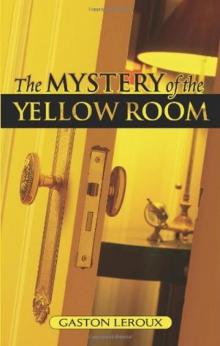 The Mystery of the Yellow Room
The Mystery of the Yellow Room The Secret of the Night
The Secret of the Night In Letters of Fire
In Letters of Fire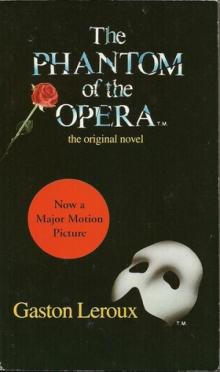 The Phantom of the Opera
The Phantom of the Opera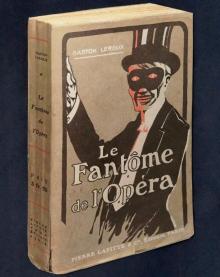 Fantôme de l'Opéra. English
Fantôme de l'Opéra. English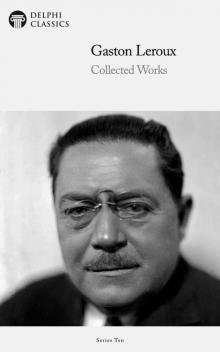 Collected Works of Gaston Leroux
Collected Works of Gaston Leroux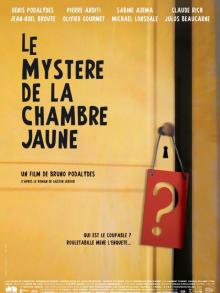 Le mystère de la chambre jaune. English
Le mystère de la chambre jaune. English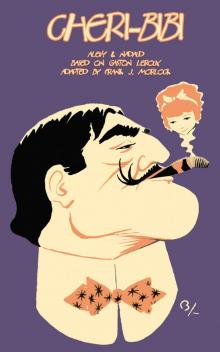 Cheri-Bibi: The Stage Play
Cheri-Bibi: The Stage Play The Phantom of the Opera (Oxford World's Classics)
The Phantom of the Opera (Oxford World's Classics)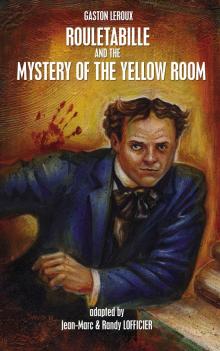 Rouletabille and the Mystery of the Yellow Room
Rouletabille and the Mystery of the Yellow Room The Perfume of the Lady in Black
The Perfume of the Lady in Black The Bloody Doll
The Bloody Doll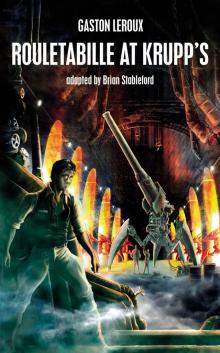 Rouletabille at Krupp's
Rouletabille at Krupp's Phantom of the Opera (Barnes & Noble Classics Series)
Phantom of the Opera (Barnes & Noble Classics Series)